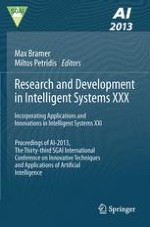2013 | OriginalPaper | Buchkapitel
Formulating the Temporal Causal Relationships Between Events and Their Results
verfasst von : J. Ma, M. Petridis, B. Knight
Erschienen in: Research and Development in Intelligent Systems XXX
Aktivieren Sie unsere intelligente Suche, um passende Fachinhalte oder Patente zu finden.
Wählen Sie Textabschnitte aus um mit Künstlicher Intelligenz passenden Patente zu finden. powered by
Markieren Sie Textabschnitte, um KI-gestützt weitere passende Inhalte zu finden. powered by
